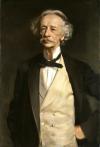Preludes.
I Frost in Harvest
The lover who, across a gulf
Of ceremony, views his Love,
And dares not yet address herself,
Pays worship to her stolen glove.
The gulf o'erleapt, the lover wed,
It happens oft, (let truth be told),
The halo leaves the sacred head,
Respect grows lax, and worship cold,
And all love's May-day promising,
Like song of birds before they pair,
Or flush of flowers in boastful Spring,
Dies out, and leaves the Summer bare
Yet should a man, it seems to me,
Honour what honourable is,
For some more honourable plea
Than only that it is not his.
The gentle wife, who decks his board
And makes his day to have no night,
Whose wishes wait upon her lord,
Who finds her own in his delight,
Is she another now than she
Who, mistress of her maiden charms,
At his wild prayer, incredibly
Committed them to his proud arms?
Unless her choice of him's a slur
Which makes her proper credit dim,
He never enough can honour her
Who past all speech has honour'd him.
II Felicity
To marry her and take her home!
The poet, painting pureness, tells
Of lilies; figures power by Rome;
And each thing shows by something else!
But through the songs of poets look,
And who so lucky to have found
In universal nature's book
A likeness for a life so crown'd!
Here they speak best who best express
Their inability to speak,
And none are strong, but who confess
With happy skill that they are weak.
III Marriage Indissoluble
In heaven none marry. Grant the most
Which may by this dark word be meant,
Who shall forbid the eternal boast
I kiss'd, and kiss'd with her consent!
If here, to Love, past favour is
A present boast, delight, and chain,
What lacks of honour, bond, and bliss,
Where Now and Then are no more twain!
The Epitaph.
I
At Church, in twelve hours more, we meet!
This, Dearest, is our last farewell.
Oh, Felix, do you love me? Sweet,
Why do you ask? I cannot tell.
II
And was it no vain fantasy
That raised me from the earth with pride?
Should I to-morrow verily
Be Bridegroom, and Honoria Bride?
Should I, in simple fact, henceforth
Live unconditionally lord
Of her whose smile for brightest worth
Seem'd all too bountiful reward?
Incredible life's promise seem'd,
Or, credible, for life too great;
Love his own deity blasphemed,
And doff'd at last his heavenly state.
What law, if man could mount so high,
To further insolence set bars,
And kept the chaste moon in the sky,
And bade him not tread out the stars!
III
Patience and hope had parted truce,
And, sun-like, Love obscured his ray
With dazzling mists, driven up profuse
Before his own triumphant way.
I thought with prayer how Jacob paid
The patient price of Rachel; then,
Of that calm grace Tobias said,
And Sarah's innocent Amen.
Without avail! O'erwhelming wealth,
The wondrous gift of God so near,
Which should have been delight and health
Made heart and spirit sick and sere.
Until at last the soul of love,
That recks not of its own delight,
Awoke and bade the mists remove,
And then once more I breathed aright;
And I rehears'd my marriage vow,
And swore her welfare to prefer
To all things, and for aye as now
To live, not for myself, but her.
Forth, from the glittering spirit's peace
And gaiety ineffable,
Stream'd to the heart delight and ease,
As from an overflowing well;
And, orderly deriving thence
Its pleasure perfect and allow'd,
Bright with the spirit shone the sense,
As with the sun a fleecy cloud.
If now to part with her could make,
Her pleasure greater, sorrow less,
I for my epitaph would take
To serve seem'd more than to possess.
And I perceiv'd, (the vision sweet
Dimming with happy dew mine eyes),
That love and joy are torches lit
From altar-fires of sacrifice.
IV
Across the sky the daylight crept,
And birds grew garrulous in the grove,
And on my marriage-morn I slept
A soft sleep, undisturb'd by love.






